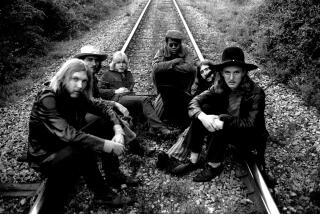Nat Adderley: The Other Brother Arrives : Jazz: Cornetist steps out of Cannonball’s shadow to make his own musical mark. His quintet visits Vine St. Bar & Grill.
- Share via
Nat Adderley is no longer someone else’s kid brother. The cornetist came to the attention of the jazz world with a quintet led by the dynamic Julian (Cannonball) Adderley, and for years he was in the shadow of his gifted and eloquent sibling. After Cannonball’s death, Nat was adrift for a while, leading groups here and there, but today, a persuasive personality in his own right, he is heading a quintet that works steadily; he’s playing through Saturday at the the Vine St. Bar & Grill.
“Yeah, things are looking really good for me right now,” he said the other day in a call from the Bay Area. “We toured Europe, I spent a couple of days back home in Tampa, then it was off to Japan--about the 10th time I’ve been there--and directly to Kimball’s in San Francisco.”
Where Cannonball once stood beside him, Nat now has a promising alto sax soloist in Vincent Herring. At the piano is a newcomer to the group, Rob Bargad. The other two faces will be familiar to longtime Adderley students: Bassist Walter Booker worked for Cannonball from 1968 until the saxophonist’s death seven years later, and drummer Jimmy Cobb was an Adderley sideman in 1957-58.
The two brothers, fresh out of Florida in 1955, zoomed into prominence via records, jazz clubs and concerts. Their partnership was interrupted when Cannonball joined Miles Davis for a couple of years, an interim filled by Nat with stints playing for J.J. Johnson and later with Woody Herman. Nat simultaneously built a secondary career as composer--his biggest hits were “Work Song” and “Jive Samba”--and occasionally as leader of his own record sessions.
If he may seem to have been less prominent on the scene recently, the problem can be traced to his infrequent visits to the recording studios. “Actually,” he said, “we made an album that was just issued--but it was for a Japanese label, for release in Japan.” He paused, then added, “Well, we are recording very shortly for Orrin Keepnew’s company, Landmark Records, for American release. Orrin made a lot of sessions with Julian and me.”
Two missed opportunities for what might have been valuable documents were the tours, early last year and again this spring, by a Woody Herman alumni unit, with Adderley, Terry Gibbs, Sal Nistico, Nat Pierce and Urbie Green among others. “That was quite a band,” Adderley recalls, “but they never got around to recording.”
Unlike many jazz eminences who raise second-generation artists in their image, Adderley takes pride in a son, Nat Jr., whose success has been enjoyed mainly outside the jazz field.
“He did play a few records and gigs with Julian and me, but he really made his mark as a pianist and arranger producing for well-known pop people. He’s been working a lot with Luther Vandross, and he’s doing marvelously--I’m very proud of him. It’s funny, I thought he didn’t want to play jazz, but now it has become an avocation; whenever he has the chance he works with the vibes player Jay Hoggard.”
A short, chubby figure with rare personal charm and the kind of soothing voice you would like to hear in your family doctor, Nat Adderley today is admired not only for his virtuosity on the horn (he was inspired by Fats Navarro, Dizzy Gillespie and Miles Davis), but also for his subtle sense of humor on the bandstand. He has reached a plateau of acceptance commensurate with his own talent. Still, the memory of his fraternal partnership refuses to fade out.
“We play a lot of that same music, and when we expand our repertoire we tend to add one new tune and one old tune. As a matter of fact, it was just 15 years ago--Aug. 8, 1975--that we lost Julian. Do I miss him? How can I not?”
More to Read
The biggest entertainment stories
Get our big stories about Hollywood, film, television, music, arts, culture and more right in your inbox as soon as they publish.
You may occasionally receive promotional content from the Los Angeles Times.








